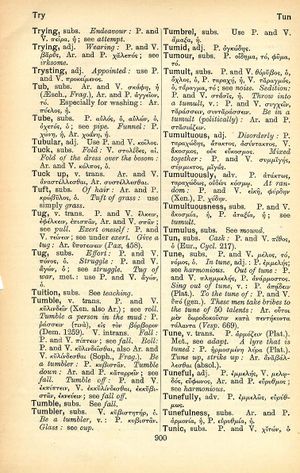tune: Difference between revisions
From LSJ
Ὁ μὴ δαρεὶς ἄνθρωπος οὐ παιδεύεται → Male eruditur ille, qui non vapulat → nicht recht erzogen wird ein nicht geschundner Mensch
(CSV5) |
m (Text replacement - "<b class="b2">Vesp.</b>" to "''Vesp.''") |
||
| Line 12: | Line 12: | ||
<b class="b2">To the tune of</b>: P. and V. ὑπό (gen.). | <b class="b2">To the tune of</b>: P. and V. ὑπό (gen.). | ||
<b class="b2">These men take bribes to the tune of 50 talents</b>: Ar. οὗτοι μὲν δωροδοκοῦσιν κατὰ [[πεντήκοντα]] τάλαντα ( | <b class="b2">These men take bribes to the tune of 50 talents</b>: Ar. οὗτοι μὲν δωροδοκοῦσιν κατὰ [[πεντήκοντα]] τάλαντα (''Vesp.'' 669). | ||
'''v. trans.''' | '''v. trans.''' | ||
Revision as of 11:45, 7 August 2017
English > Greek (Woodhouse)
subs.
P. and V. μέλος, τό, νόμος, ὁ.
In tune, adj.: P. ἐμμελής; see harmonious.
Out of tune: P. and V. πλημμελής, P. ἀνάρμοστος.
Sing out of tune, v.: P. ἀπᾴδειν (Plat.).
To the tune of: P. and V. ὑπό (gen.).
These men take bribes to the tune of 50 talents: Ar. οὗτοι μὲν δωροδοκοῦσιν κατὰ πεντήκοντα τάλαντα (Vesp. 669).
v. trans.
P. ἁρμόζειν (Plat.).
Met., see adapt.
A lyre that is tuned: P. ἡρμοσμένη λύρα (Plat.).
Tune up, strike up: Ar. ἀναβάλλεσθαι (absol).

